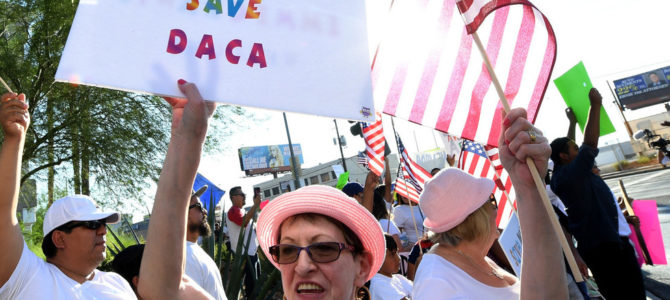
When Senate Minority Leader Chuck Schumer surrendered to Republicans on Monday, some left-leaning political analysts argued that Democrats had showed absolutely no spine during the government shutdown, while others argued that Democrats hadn’t had the time to properly craft a winning message. Rarely considered, however, was the notion that the message itself was the problem.
Democrats, after all, had counted on outpouring of rage against the Republicans, particularly Donald Trump, for failing to legalize the children of illegal immigrants in the budget bill. To stoke this anger, Democrats were forced to vote against funding the government and against the longest-ever extension of CHIP — a program to insure poor children!
It didn’t work, even though polls assured them it should. So perhaps one of the lessons of the shutdown is that voters hold more nuanced views on immigration than partisans in Washington would like to admit. Perhaps the platitudes people plaster on protest signs to feel morally superior don’t always translate into realistic policy.
If you ask Americans an idealistic question about immigration, they almost always offer you an idealistic response. That’s because outside of a minority of nativists, there’s broad consensus among voters that immigration is a net positive and that the nation should nurture it.
On the other hand, if you dig deeper, it gets a lot more complicated. Year after year Gallup polls show that a majority of Americans want to keep incoming numbers the same or decrease them. In a recent Harvard-Harris poll, for example, 35 percent said they wanted fewer than 250,000 new immigrants a year. Another 19 percent said it should be between 250,000 and 500,000. Only 18 percent said they want to see 500,000 to 1 million.
The United States already allows over a million people to obtain permanent resident status every year. This number, obviously, doesn’t account for the millions that come here temporarily — around 4.4 million in 2016 — or the number that come here illegally. In 2016 the foreign-born population, according to the Census Bureau, was 45.6 million people. The share of the U.S. population, legal and illegal, is over 13 percent. Personally, I’d like to see far more legal immigration — and amnesty for all Dreamers — but the idea that we’re a country unwelcoming of foreigners is a myth.
Maybe, once you brush aside the emotionalism and moralizing of Democrats, more voters than we think are uneasy about the lawlessness that is inherent in our immigration non-policy. Maybe the liberal’s own absolutist position on the issue isn’t a winner. Politically speaking, Democrats have gone from advocating America welcome immigrants who embrace American values and follow our laws to arguing that every person in the entire world has an inherent right to come to the United States — legally or illegally — without any preconditions and without any concerns and without any consequences. “Comprehensive immigration reform,” once a batch of wide-ranging ideas about effective immigration, temporary worker permits and enforcement, including funding for a “wall,” has now become euphemism for legalization.
Yes, Trump, and many of his ardent supporters have shown nativist and protectionist inclinations (the latter a problem growing on both sides). But as Democrats pointed out during the shutdown, Republicans have expressed an interest in fixing DACA. So has Trump. Correcting Barack Obama’s executive abuse through legislation makes both political and moral sense for the GOP.
Yet, Republicans who hold, broadly speaking, the same opinion on immigration they did last year, and 10 years ago and 30 years ago, have every right to tie DACA to enforcement. Logically speaking, Democrats can’t simultaneously contend that the borders are already secure and argue we have an obligation to legalize 800,000 illegal immigrant children and another 11 (or whatever it is) million illegal immigrants. How did they get here? How will the dynamic change in the future? All the arguments now in play for DACA will be in play a decade from now. Do we do this every decade?
Now Mitch McConnell has promised to allow an up-or-down vote on DACA in early February that ensures the immigration debate will consume Washington for the next few weeks. It seems there’s already consensus forming among analysts that this is a loser for Republicans. But maybe the lesson of the shutdown is that DACA, and the debate surrounding illegal immigrants in general, isn’t as simple or as powerful as Democrats imagine. Maybe the shutdown’s lesson is that Trump can hold out for a wall and other concessions on chain migration and enforcement in exchange for an easier path towards legalization for those already here. Maybe the lesson is that a deal is available.
Because if the wall is just a silly, ineffective, useless prop then certainly it would make sense for Democrats to accede to its creation to help legalize the Dreamers and create a more rational and ethical immigration policy. If they don’t, cynical people might start to get the impression that Democrats are far more interested in creating millions of new Democrats than they are in creating a lawful and rational process that respects the sovereignty of their nation.








